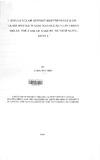| dc.description.abstract | The- generation of solid waste has become an increasing environmental and public health problem in the world, but particularly in developing countries. The fast expansion of urban, '' agricultural and industrial activities spurred by rapid population growth has produced vast amounts of solid and liquid wastes, which pollute the environment and destroy resources. The ' management of solid waste is often weak due to lack of appropriate planning, inadequate
1. governance, poor technology, weak enforcement of existing legislation and the absence of economic and fiscal incentives to promote environmentally sound development. The Government of Kenya has currently prioritized solid waste management as a pressing issue and recognizes the value and importance of integrating environmental and development objectives into the decision-making process. The study examined the success of the deposit refund system, as a measure of controlling the dilapidated Nakuru Municipality. It is a Policy issue that is of major concern not to Kenya alone but to other African countries. Nakuru Municipality faces massive pollution from all sorts of waste of both biodegradable and non biodegradable waste. The study examined the cost effectiveness of the deposit refund system in the management of glass bottle waste.
The study also examined the system of returns and the deposit refund system in the management of glass bottle waste as applied within Nakuru Municipality. Other objectives of the study were determination of the challenges faced in the implementation of the deposit refund system in the management of glass bottle waste; and finding out the strategies adopted by Nakuru Municipality in enhancing the success of the deposit refund system. The study was carried out amongst Nakuru Municipality Environment department employees and amongst members of the business community. The study used a sample of 96 members of the business community and 44 Nakuru Municipality employees.
The study adopted a descriptive survey design and purposive sampling technique in the identification and selection of the study sample. Data was collected by use of questionnaires and interview schedules and was analysed with the aid of the statistical package for social sciences. The results were then presented in the form of tables. The finding of the study showed that there was high usage of deposit refund systems on glass bottles in Nakuru Municipality. The study also established that the deposit refund system was cost effective in the management of glass bottles. It was also, established that the system of bottle returns was characterized by delay of refunds and failure of consumers and customers to return bottles in time. The system's implementation was characterized with challenges such as high transportation and bottle storage costs.
The vendors also complained of much time spent on deposits and bottle returns, which negatively affected the systems' expected impact on glass bottle. Following these findings, the study recommended that the Government of Kenya - Ministry of Environment should spearhead the review of recycling policies in the country for products such as glass and bottles for the efficiency of the glass bottle waste; that members of the public should be educated / sensitized on the value or benefits associated with the deposit refund system. The study also recommended that the Municipal Council ofNakuru needed to put structures in place to enhance the performance of the deposit refund system within the Municipality.
The study also recommended that, the Municipal Council of Nakuru consider the use of Penalties for broken bottles in order to control carelessness in the handling of bottles. The information obtained from this study, is important to the Ministry of Environment and Natural Resources, the Ministry of Local Government, other Governmental and Non Governmental Organisations and stakeholders within the community for it could be useful for enhancing the effectiveness of the Deposit refund system towards promoting a managed glass bottle waste. | en_US |

